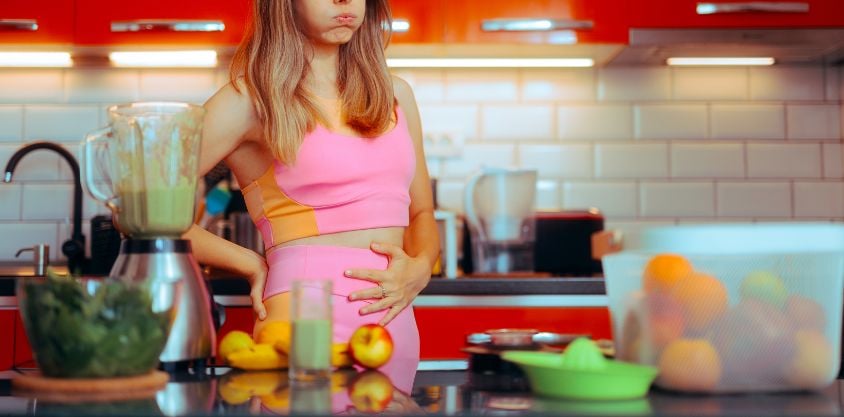You know that awful feeling when your stomach looks like you swallowed a balloon? Yeah, we’ve all been there. One minute you’re feeling great, and the next minute your jeans are suddenly way too tight. Ugh!
Here’s the thing, though. You don’t have to just deal with it. Your fridge is probably already full of anti-bloating foods that can help you feel way better. No weird pills or crazy diets needed.
Bloating can make you feel uncomfortable and insecure, but it’s totally normal. It happens when gas gets trapped in your belly or when your body holds onto too much water. The good news? There are tons of yummy foods that can help fix this problem naturally.
Why Does Your Stomach Get All Puffy?
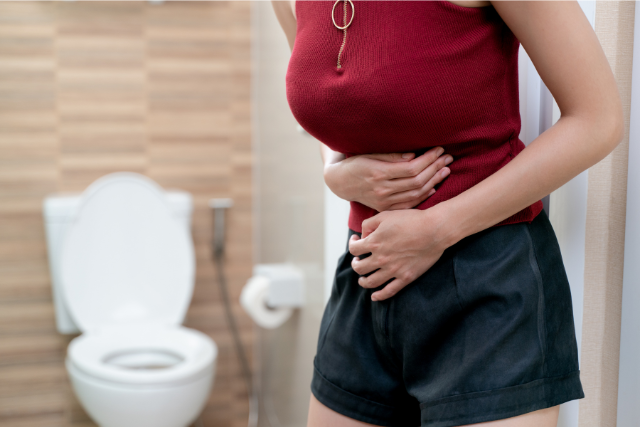
Let’s keep this simple. Your belly gets bloated for a few main reasons:
- Too much gas gets trapped
- Your body holds onto water
- You’re constipated
- You ate something that doesn’t agree with you
Once you know what’s causing the problem, it’s way easier to fix it!
17 Amazing Anti-Bloating Foods
1. Cucumbers
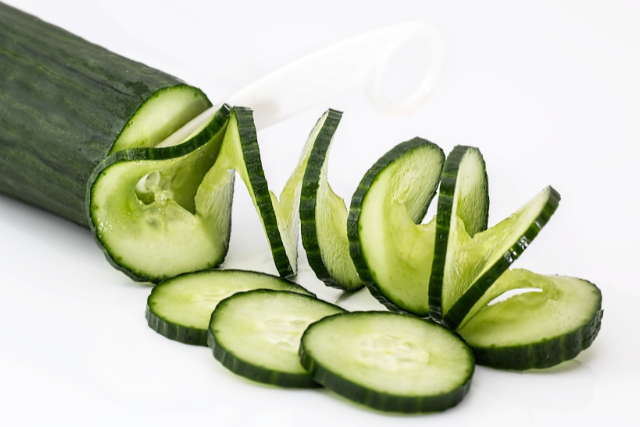
Cucumbers are 95% water, which helps keep you hydrated. When you’re dehydrated, your body holds onto water and causes bloating.
The high water content flushes out excess sodium that makes you feel puffy.
2. Bananas
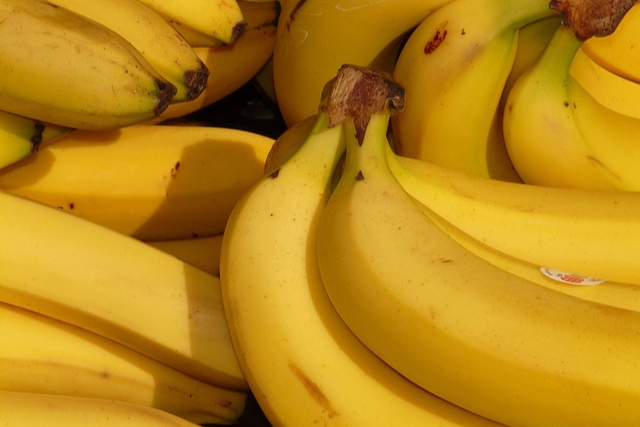
Bananas contain high levels of potassium, which balances sodium in your body. This helps reduce water retention that causes bloating.
One medium banana provides 358mg of potassium.
3. Avocados
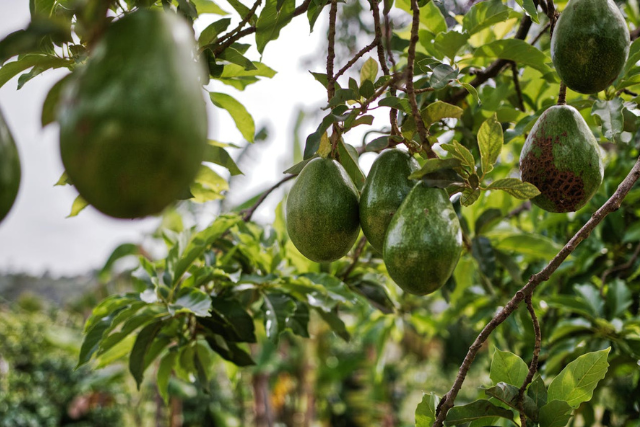
Avocados provide both potassium (975mg per fruit) and fiber (10g per fruit). Potassium reduces water retention while fiber helps food move through your digestive system smoothly.
4. Yogurt
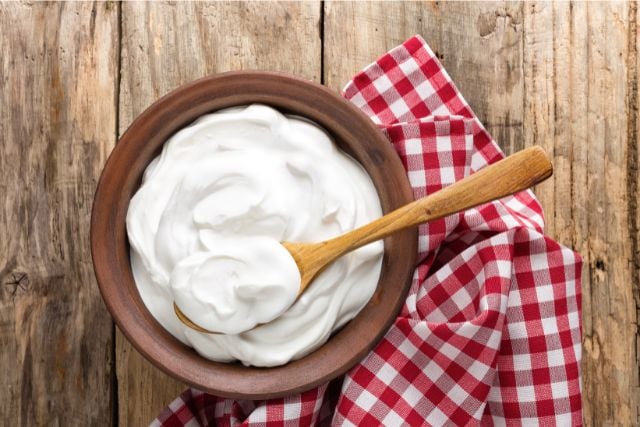
Plain yogurt contains probiotics – beneficial bacteria that improve gut health. These probiotics help reduce bloating and gas by balancing your digestive system.
Choose varieties with live active cultures.
5. Ginger

Ginger speeds up stomach emptying, which prevents gas buildup. It also reduces inflammation in your digestive tract.
You can use fresh ginger, ginger tea, or ginger supplements.
6. Papaya

Papaya contains an enzyme called papain that breaks down proteins and improves digestion. This helps prevent the heavy, bloated feeling after meals.
Fresh papaya works better than dried.
7. Asparagus

Asparagus acts as a natural diuretic, helping your body eliminate excess water. It also contains prebiotics that feed good gut bacteria. One cup provides 3g of fiber.
8. Pineapple

Fresh pineapple contains bromelain, an enzyme that helps digest proteins and reduces inflammation. This can prevent bloating after protein-heavy meals.
Canned pineapple has less bromelain.
9. Fennel

Fennel relaxes the muscles in your digestive tract, allowing gas to pass through easier. It’s been used traditionally to treat digestive problems.
You can eat the bulb or drink fennel tea.
10. Celery
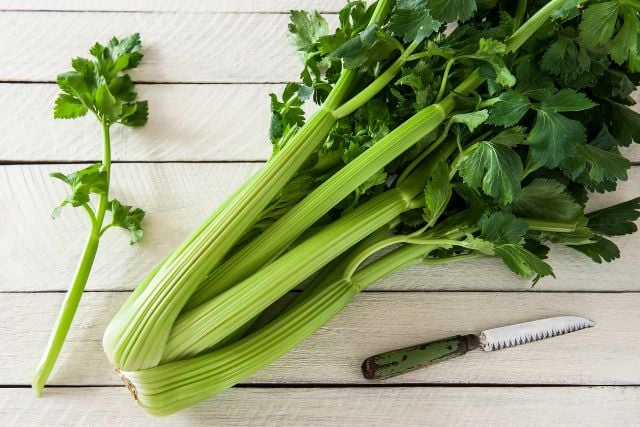
Celery is 95% water and contains compounds that act as natural diuretics. It helps reduce water retention and provides fiber for healthy digestion. Each stalk has about 1g of fiber.
11. Berries

Berries are high in fiber and antioxidants that reduce inflammation. Strawberries, blueberries, and raspberries all help improve gut health. One cup of berries provides 6-8g of fiber.
12. Oats
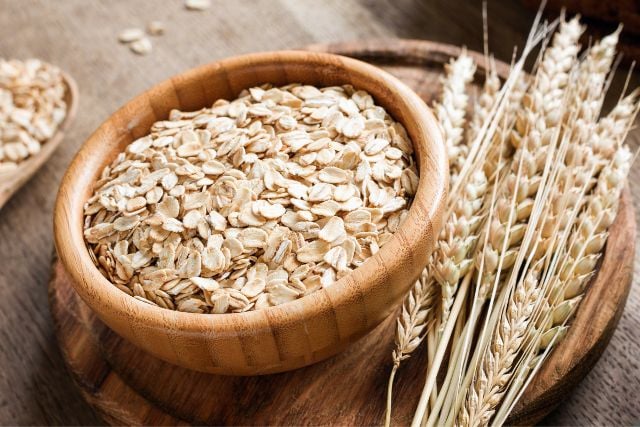
Oats contain soluble fiber that helps regulate bowel movements and reduces gas production. A half-cup serving provides 4g of fiber.
Choose plain oats without added sugars.
13. Quinoa
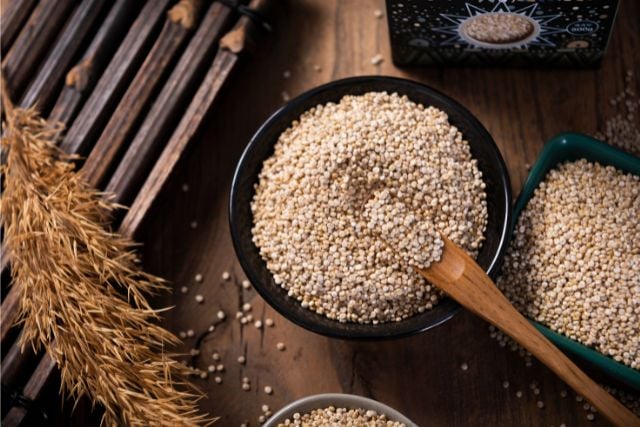
Quinoa is gluten-free, making it easier to digest for people sensitive to gluten. It provides both protein (8g per cup) and fiber (5g per cup) to support healthy digestion.
14. Turmeric
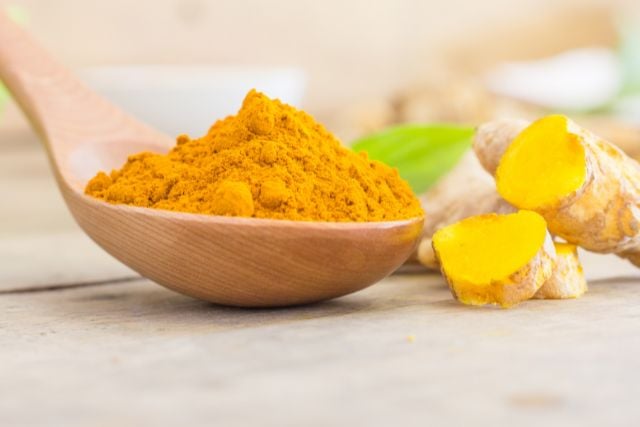
Turmeric contains curcumin, which reduces inflammation in the digestive system. Studies show it may help with irritable bowel syndrome symptoms including bloating.
Use 1-2 teaspoons daily.
15. Kiwi
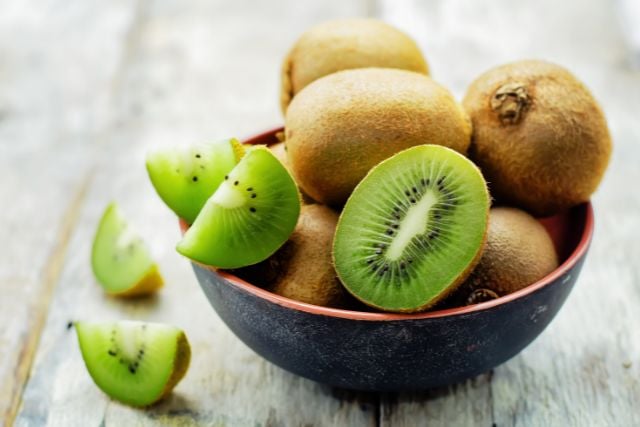
Kiwi contains actinidin, an enzyme that helps break down proteins and speeds up digestion. Two kiwis provide 5g of fiber and significant vitamin C for gut health.
16. Almonds

Almonds provide healthy fats and protein that promote satiety without causing bloating. A 1-ounce serving (23 almonds) gives you 3.5g of fiber and helps control hunger.
17. Spinach and Other Leafy Greens
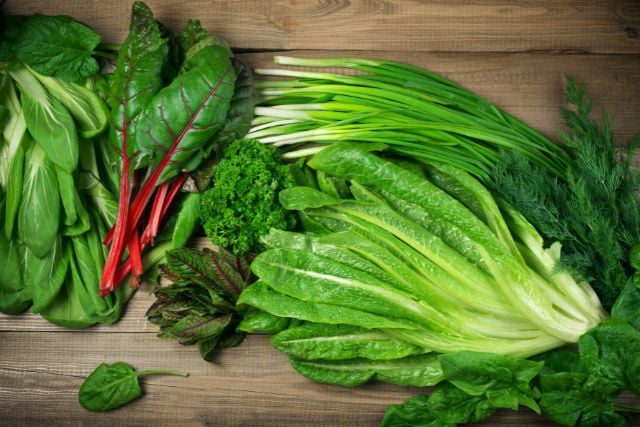
Spinach, kale, and other leafy greens are easy to digest, and provide fiber, vitamins, and minerals.
They’re low in calorie,s but high in nutrients that support digestive health.
Drinks That Help Too
Don’t forget about what you’re drinking! These can make a huge difference:
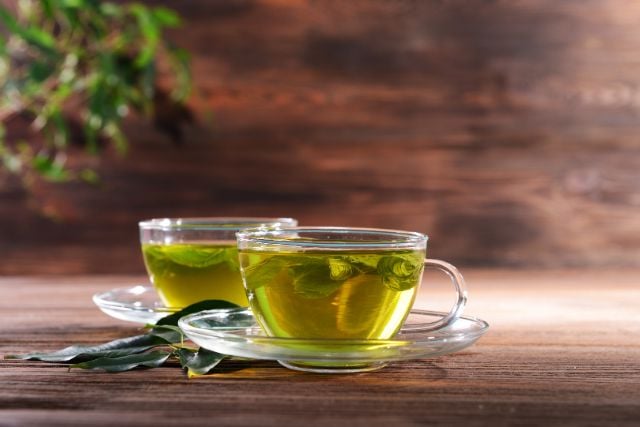
- Green Tea: Has antioxidants and a little caffeine to help keep things moving.
- Peppermint Tea: This is the classic choice for upset stomachs and bloating.
- Lemon Water: Great for hydration and can help with digestion, especially first thing in the morning.
Foods That Make Bloating Worse
While we’re talking about the good stuff, here are some foods that might make you feel worse:
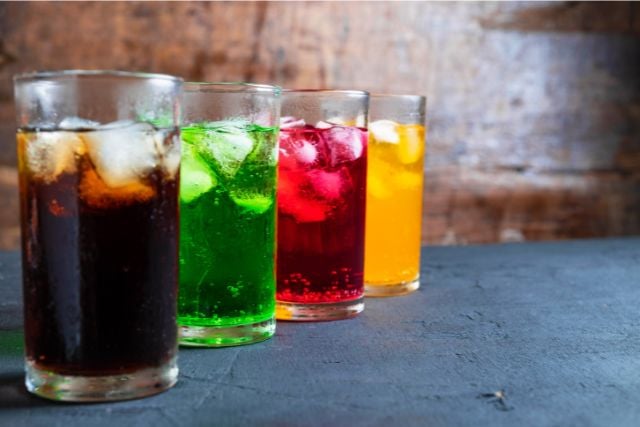
- Soda and fizzy drinks (all those bubbles have to go somewhere)
- Beans (they’re healthy but can be super gassy)
- Broccoli and cauliflower (again, healthy but sometimes bloating)
- Milk and chees, if your stomach doesn’t handle dairy well
- Really salty foods
Learn about the causes, symptoms, and healing tips in our comprehensive guide to leaky gut syndrome.
How to Make These Anti-Bloating Foods Work Better
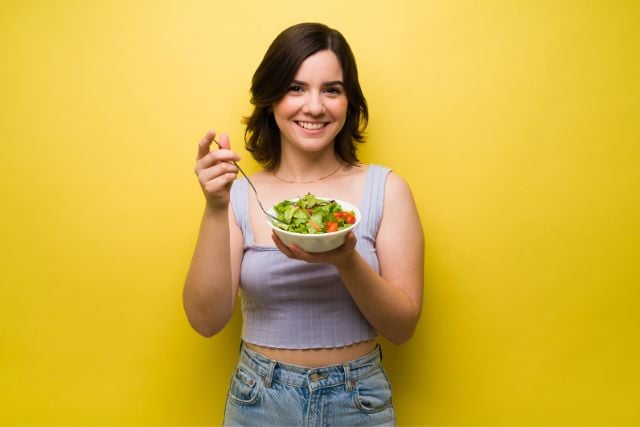
1. Start Small
Don’t try to eat all 17 foods in one day. Pick two or three you actually like and start there.
2. Drink Water
Most of these foods work way better when you’re drinking enough water throughout the day.
3. Slow Down
Even the best anti-bloating foods won’t help if you’re wolfing them down in two seconds.
4. Pay Attention
Notice which foods make you feel better and which ones don’t. Everyone’s different.
5. Move Around
A quick walk after eating helps these foods do their job even better.
Signs Your Anti-Bloating Foods Are Working
Look for these positive changes as you add more anti-bloating foods to your diet:
Week 1-2
You may notice less gas and easier bowel movements. Your stomach might feel less tight after meals.
Week 3-4
Clothing fits better around your midsection. You experience fewer episodes of uncomfortable bloating.
Month 2
Your overall digestion improves. You have more regular bowel movements and increased energy levels.
Long-term
Reduced inflammation, better gut health, and consistent comfort after eating become your new normal.
Quick Anti-Bloating Food Combinations
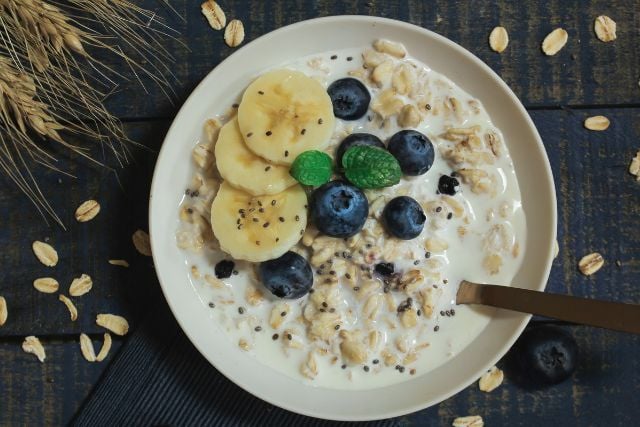
These simple combinations work especially well together:
- Morning Boost: Lemon water + ginger tea + banana with oats
- Pre-Meal Prep: Fennel tea + small handful of almonds
- Post-Meal Relief: Fresh pineapple + peppermint tea
- Hydration Helper: Cucumber water + leafy green salad with avocado
- Evening Comfort: Turmeric tea + small serving of plain yogurt
Final Thought
Here’s the deal. Bloating totally sucks, but you don’t have to deal with it anymore. These 17 anti-bloating foods can help you more than you think!
You don’t need to eat all of them every day. Just pick the ones you actually like and start adding them to your meals. Your stomach will thank you, and your jeans will fit way better. Start small, listen to your body, and be patient. Once you try these anti-bloating foods, you’ll wonder why you waited so long.
Your kitchen already has everything you need to feel amazing. Time to ditch that uncomfortable, bloated feeling for good!






